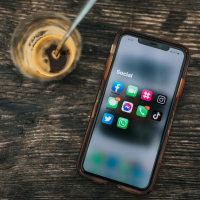
Behavioural interventions delivered through interactive social media for health behaviour change, health outcomes, and health equity in the adult population
Read the review here
Photo by Nathan Dumlao on Unsplash
Key messages
Programmes on social media (such as Facebook or Twitter) that aim to increase physical activity may help people to become more physically active and may improve people's well‐being.
Future studies are needed to find out if there are any unwanted effects associated with taking part in interactive social media programmes.
What is social media?
Social media are computer‐based technologies that help people to share ideas, thoughts and information by building virtual networks and communities on the Internet; examples include, Facebook, Twitter or WhatsApp. Social media networks are 'interactive': the user communicates directly with a computer, or other device, to share and receive information.
What did we want to find out?
People who use social media can exchange ideas and share updates about their behaviours, such as becoming more active or eating more healthily. We wanted to find out if health programmes using interactive social media could change people's behaviours and improve their health.
What did we do?
We searched for studies that tested the effects of interactive social media programmes on people's health. We were interested in how the programmes might affect people's:
‐ health behaviours (such as smoking, drinking alcohol, breastfeeding, dieting, physical activity; seeking and using health services);
‐ health (such as physical fitness, lung function, asthma episodes);
‐ mental health (such as measures of depression, stress, coping);
‐ well‐being; and
‐ whether people reported any unwanted effects related to interactive social media programmes.
How up to date is this review?
We included evidence published up to 1 June 2020.
What did we find?
We found 88 studies involving 871,378 adults (aged 18 years and older). Most studies (49) took place in the USA; all studies took place in either high‐income countries or upper middle‐income countries. Facebook was the most commonly used social media platform; others included WeChat, Twitter, WhatsApp and Google Hangouts.
In most studies the effects of interactive social media programmes were compared against non‐interactive programmes, including paper‐based or in‐person programmes, or no programme. Ten studies compared two social media programmes against each another; for these studies we chose the more interactive of the two programmes as the 'interactive social media programme'.
What are the main results of our review?
Compared with non‐interactive programmes, social media programmes:
‐ may improve some health behaviours, such as increasing the number of daily steps taken, or taking part in screening tests, but may show little to no effect on other health behaviours, such as better diet or reducing tobacco use (evidence from 54 studies in 20,139 people).
‐ may cause small improvements in health, such as a small increase in amount of weight lost, and a small reduction in resting heart rate (evidence from 30 studies in 4521 people).
‐ may improve people's well‐being (evidence from 16 studies in 3792 people).
‐ may have little to no effect on people's mental health, such as depression (evidence from 12 studies in 2070 people).
No studies reported any unwanted effects related to using social media.
What are the limitations of the evidence?
Overall, our confidence in the evidence is low. Many studies did not report clearly how they were conducted. In most studies, people knew whether they were taking part in an interactive programme, and this may have affected the results of the study. Some of the studies did not report all their results, and there were wide variations in the results of some studies. Further research is likely to increase our confidence in the evidence.
